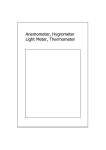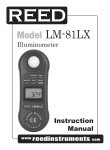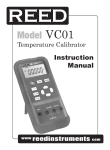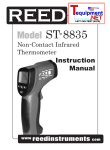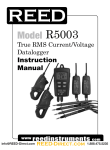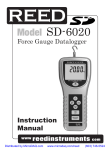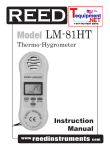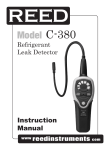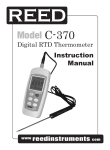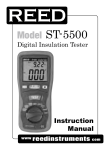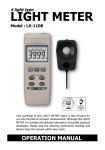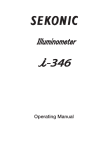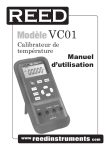Download Reed LM-8000 User Manual
Transcript
Model LM-8000 4-in-1 Pocket Thermo-Anemometer, Hygrometer, Thermometer & Illuminometer Instruction Manual www reedinstruments com Table of Contents Features.......................................................................................2-3 Specifications..............................................................................3-4 Instrument Description................................................................... 5 Measuring Procedures................................................................5-6 Air Velocity Measurement............................................................. 5 Temperature Measurement (Thermocouple)..............................5-6 Relative Humidity Measurement................................................... 6 Light Measurements.................................................................... 6 Additional Functions....................................................................... 7 Hold Function.............................................................................. 7 Data Record Function.................................................................. 7 Auto Power Off ........................................................................... 7 Battery Replacement...................................................................... 8 For service on this or any other REED product or information on other REED products, contact REED Instruments at [email protected]. Features • 4-in-1 professional measuring instrument: Anemometer, Hygrometer, Thermometer, and Light meter • Tiny bone shape with lightweight and small size case design are . suitable for handling with one hand • Wristlet design provides extra protection to the instrument especially . for user one hand operation • Low-friction ball bearing mounted wheel design provides high accuracy at high and low air velocity www reedinstruments com • Exclusive photo diode and color correction filter light sensor, spectrum meets C.I.E. photopic • High precision thin-film capacitance humidity sensor with fast response to the humidity changes • Standard type K (NiCr-NiAl) thermocouple input jack suitable for all kinds of type K probe • Built-in microprocessor circuit assures excellent performance and accuracy • Concise and compact buttons arrangement, easy operation • Memorize the maximum and minimum value with recall • °C/°F selectable by pressing button on the front panel • Lux/Feet-candle selectable by pressing button on the front panel • Zero button design makes light meter calibration • Hold function to freeze the current reading value Specifications General Specifications Display Measurement Operating Humidity Operating Temp. Over Input Display Power Supply Power Consumption Weight Dimensions Optional Accessories: 8 mm LCD display Anemometer, Humidity, Temperature & Light Max. 80% RH. 0 to 50°C (32 to 122°F) Indication of “- - - -” 006P DC 9V battery (Heavy-duty type) Approx. DC 6.2 mA 160g (battery included) 156 H x 60 W x 33 D mm (6.14 x 2.36 x 1.29”) Model CA-52A Carrying Case. Temperature probes: Model LS-109 Surface Probe: Ribbon style probe with a maximum temperature of 400°C. Model LS-139 Surface Probe: Spring loaded probe is ideal for all high temperature applications. Model LS-104 Right Angle Surface Probe: Unique right angle design allows temperature of hard to reach areas to be taken. Model LS-103 Air/Gas Probe: Perforated shield permits fast response while providing element protection. . Model LS-107 General Purpose Probe: Used to measure both air and liquids, but is recommended for immersion applications. Model LS-134A Needle Tip Probe: Medium gauge hypodermic needle tip, used to measure softer food stuffs, . rubber and solids. www reedinstruments com Electrical Specifications (23 ± 5°C) Measurement Air velocity Humidity Light *auto range ft/min m/s km/h MPH knots Temperature (thermister) % RH Temperature (thermister) Lux Ft-cd Temperature (Type K) Measurement Range Air velocity 80 to 5910 ft/min 0.4 to 30.0 m/s 1.4 to 108.0 km/h 0.9 to 67.0 mile/h 0.8 to 58.3 knots 32 to 122°F 0 to 50°C 10 to 95 %RH Humidity Light Temperature (Type K) 32 to 122°F 0 to 50°C 0 to 20,000 Lux 0 to 2,000 Ft-cd -148 to 2372°F -100 to 1300°C ft/min = feet per minute m/s = meters per second km/h = kilometers per hour www Range Resolution 80 to 5910 ft/min 0.4 to 30.0 m/s 1.4 to 108.0 km/h 0.9 to 67.0 mile/h 0.8 to 58.3 knots 32 to 122°F 0 to 50°C 10 to 95 %RH 32 to 122°F 0 to 50°C 0 to 2,200 Lux 1,800 to 20,000 Lux 0 to 204.0 Ft-cd 170 to 2,000 Ft-cd -148 to 2372°F -100 to 1300°C 1 ft/min 0.1 m/s 0.1 km/h 0.1 MPH 0.1 knots 0.1°F 0.1°C 0.1 %RH 0.1°F 0.1°C 1 Lux 10 Lux 0.1 Ft-cd 1 Ft-cd 0.1°F 0.1°C Accuracy ≤ 20 m/s : ± 3% F.S. . > 20 m/s : ± 4% F.S. ± 2.5°F ± 1.2°C < 70% RH : ± 4 %RH; . ≥70% RH : ± ( 4%rdg + 1.2 %RH ) ± 2.5°F ± 1.2°C ± 5% rdg ± 8 dgt ± (1% rdg + 2°F) ± (1% rdg + 1°C) MPH = miles per hour knots = nautical miles per hour Ft-cd = foot candle reedinstruments com Instrument Description 1 - Power Button 2 - Hold Button 3 - Max/Min Button 4 - Unit/Zero Button 5 - °C/°F Button & Lux/Ft-cd Button 6 - Function Button 7 - Air Flow Sensor 8 - Thermocouple Input Socket 9 - R.H. Sensor 10 - Light Sensor 11 - LCD display 12 - Battery Compartment/Cover 13 - Wristlet Measuring Procedures Air Velocity Measurement 1) Power on the instrument by pressing the “Power Button” (#1, above). 2) Select the Anemometer function by pressing “Function Button” . (#6, above). 3) Press the “Unit/Zero Button” (4, above) to select unit that you want and then face the “Air Flow Sensor” (7, above ) to the source of wind. 4) Allow time for the reading to become stable and note the value . indicated. From a practical point of view the velocity may fluctuate. Temperature Measurement (Thermocouple) 1) Power on the instrument by pressing the “Power Button” (#1, above). 2) Plug a type K thermocouple probe in the “Thermocouple Input Socket” (#8, above). 3) Select the Temperature function by pressing “Function Button” . (#6, above). 4) Contact the Thermocouple Sensor Head with the object being . measured and the reading value will be displayed on the LCD display. www reedinstruments com Measuring Consideration of Temperature Measurement (Thermocouple) • Make sure the polarity is correct when you plug a thermocouple probe in the Temperature Input Socket (#8, above). • The temperature difference between thermocouple probe and thermometer will cause an inaccurate measuring result. Therefore, for the best measuring and accuracy performance, whenever changing a probe or plugging in a new probe, thermal equivalence between the probe plug and meter’s input socket is required. The thermal equivalent procedure may take few minutes and only needs to be done when the probe has been exposed to an ambient temperature different from the meter. Humidity & Ambient Temperature Measurement 1) Power on the instrument by pressing the “Power Button” (#1, page 5). 2) Select the Relative Humidity function by pressing “Function Button” (#6, page 5). 3) Meanwhile the reading value of relative humidity and temperature will be displayed on the LCD display. 4) When the meter is applied in a new environment, it will take a few . minutes to reach a stable condition. Light Measurement 1) Power on the instrument by pressing the “Power Button” (#1, page 5). 2) Select the Light Measurement function by pressing the “Function . Button” (#6, page 5) until the light value is displayed. The light display digits are oriented 180° from the other function displays for easy . exposure and output reading of the light sensor. 3) Press the “Lux/Ft-cd Button” (#5, page 5) to select measuring unit “Lux” or “Ft-cd”. Zero Offset Adjustment of Light Function • For best results you should zero the light sensor prior to use in a dark environment. To achieve this, place the light sensor end of the meter under a desktop or flat surface to block any light. Press the “Unit/Zero Button” (#4, page 5) setting the meter indication to zero. • The zero point can drift due to environment temperatures, battery power, as well as various other reasons. It is recommended that the zero be checked frequently using the above procedure. www reedinstruments com Additional Functions Hold Function Pressing the “Hold Button” (#2, page 5) will freeze the current value with a “HOLD” symbol on the display. Press again to release the hold function. Data Record Function 1. The Data Record function records & displays the maximum and . minimum reading values. Start the Data Record function by pressing the “Max./Min. Button” (#3, page 5) once. There will be a “REC” . symbol on the display. 2. With the REC symbol on the display: (a) Press the “ Max./Min. Button “ (#3, page 5) once and the “Max” . symbol along with the maximum value will appear on the display. (b) Press the “Max./Min. Button” again, the “Min” symbol along with . the minimum value will appear on the display. (c) To exit the memory record function, press the “Max./Min. Button” continuously for at least 2 seconds. The display will revert to the current reading. (d)To clear the Max./Min. value recorded by pressing the “Hold Button” (#2, page 5) once. The previously recorded Max./Min. value will be lost and then revert to the REC. function continuing to record. Auto Power Off In order to prolong the battery life, the instrument has “Auto Power Off” function. The meter will switch off automatically if no buttons are pressed for around 10 minutes. www reedinstruments com Battery Replacement 1. When the left corner of the LCD display shows the low battery symbol . “ ”, this indicates that replacement of the battery is then needed. However specification measurements could still be taken for another few hours before the meter becomes inaccurate. 2. Open the Battery Cover (#8, page 4) at the back of the meter and remove the battery. 3. Replace with a 9V battery (alkaline or heavy-duty type) . and reinstall the cover. For service on this or any other REED product or information on other REED products, contact REED Instruments at [email protected]. Notes _ _________________________________________ ________________________________________________ ________________________________________________ ________________________________________________ ________________________________________________ ________________________________________________ ________________________________________________ ________________________________________________ ________________________________________________ ________________________________________________ www reedinstruments com









